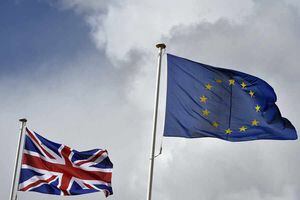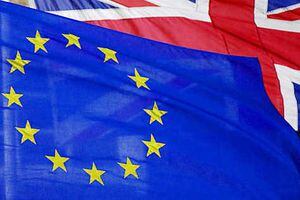The EU debate: Won't you stay? Must you go?
Confused by Europe? Don't worry, you aren't alone.

Latest polls say more than a third of people don't really know whether they will vote for Britain to Stay or Leave when the referendum comes on June 23.
Today the Shropshire Star attempts to provide you with at least some of the information you might need to help you.
Of course there are no real right or wrong answers – it all comes down to your point of view.
And no-one really knows the impact of the UK leaving the EU or indeed how the Union will change if it stays in.
David Cameron claims he has provided some of the answers with his recent negotiations. Whether he has done enough to convince the people will become apparent in June.
In the meantime, let us guide you through the arguments...
Migration
For
Free movement of labour is at the heart of the EU's vision, and despite David Cameron's claim that regaining control of Britain's borders was fundamental to remaining within the union, he failed to persuade fellow EU leaders to agree to any curbs on migration.
In other words, it will be pretty much as you were, with anybody in the EU having the right to live and work in Britain.
One concession that the Prime Minister did secure was the "emergency brake", which will allow any EU country to alert the authorities if it is experiencing immigration of "exceptional magnitude" over "an extended period of time".
The EU can then authorise that state to restrict in-work benefits for up to four years for new migrants entering the country.
Against
Immigration is one of the most oft-quoted reasons why eurosceptics call for the UK to leave the European Union,
The Ukip has called for an Australian-style points-based system, where immigration cases will be assessed on the skills that migrants will bring to the country.
It would also mean that people from other EU nations will be subjected to the same restrictions as those outside the union, whereas at the moment Britain cannot refuse entry to people from within the union. Leave campaigners say this will create job opportunities for British workers and boost wages. They also argue it will lead to a level playing field, where skilled professionals from non-EU countries will have the same opportunity to move to Britain as those from Europe.
Economy

For
Ryan Air's chief executive Michael O'Leary is in no doubt that UK voters should vote 'Yes' to Europe. He this week called on his staff and "the vast majority" of Ryanair passengers "to help deliver a resounding 'Yes' vote on 23 June".
Mr O'Leary, pictured, says EU membership gives British firms access to an £11.8 trillion single market of 500 million people, supporting three to four million jobs.
He is supported by the pro-EU Confederation of British Industry, which says 76 per cent of its members say the ability to freely buy and sell products in the EU has had a positive impact on their business, including 74 per cent of small and medium-sized firms.
A CBI literature review suggests the net benefit of EU membership to the UK could be in the region of four to five per cent of GDP or £62 billion to £78 billion a year.
"The UK firms' access to the Single Market goes beyond a standard free-trade agreement," says the CBI, adding that by removing tariffs and customs regulations, it makes trade between member states simpler and more efficient.
"It has taken strides towards removing non-tariff barriers, such as different product regulations, by enforcing EU-wide competition law and coordinating product regulations," the body added.
The CBI claims that trade with countries in Europe could have increased by as much as 50 per cent as a result of EU membership.
This week the Remain campaign received a boost after the chairmen or chief executives of 36 FTSE 100 companies signed a letter backing the campaign to stay in the EU.
Against
The impact on the economy is thought to be one of the biggest factors affecting how people will vote – although opinions are sharply divided on what Brexit would mean.
Leave campaigners say an EU exit would free firms from EU regulations and red tape, with small-and medium-sized firms who don't trade with the EU benefiting the most. And while the bosses of 36 FTSE 100 firms might have signed a letter in support of the Remain campaign, the other 64 chose not to support it. At present the EU has trade agreements with more than 50 countries outside the bloc, and is currently negotiating a number of other agreements. It is therefore reasonable to assume there would be little difficulty in an independent Britain coming to an agreement with the EU on trade, Eurosceptics will argue.
They also point out that Britain actually imports more than it exports to Europe, and trades with the EU at a loss. The EU therefore has more to gain from allowing the UK access to the single market.
The Institute for Economic Affairs says: "Jobs are associated with trade, not membership of a political union, and there is little evidence to suggest that trade would substantially fall between British businesses and European consumers in the event the UK was outside the EU. The UK labour market is incredibly dynamic, and would adapt quickly to changed relationships with the EU."
Leave campaigners also argue that the British economy is performing much more strongly than the rest of Europe, and that it is markets such as Brazil, Russia, India and China that have the greatest potential for export growth.
Bill McClements, former Telford & Wrekin councillor, leads Labour's Stay campaign in the region. He says why we must Stay.

I will be voting for the UK to remain in the EU.
I will do so because I believe in the principle of co-operation not isolation but also for hard-headed practical reasons and, above all, for the future of our children and grandchildren.
As a retired engineer who's been involved in business all over the world – in Europe, the USA, Japan, China – I know from direct experience just how important our relationship with Europe is for Britain's economy. The idea of quitting the Single Market, the biggest, wealthiest market in the world for our goods and services, fills me with dread, as it does so many of the UK's business leaders.
More than 44 per cent of our global trade is with the EU and 46 per cent of all investment into the UK is from the EU. Out campaigners say we can find other markets but that's a fantasy: our trade with Commonwealth countries is just 8.5 per cent, with China it's six per cent and the USA 14 per cent.
London is currently the biggest financial centre in Europe. Were we to leave the EU, the focus for banking and financial services would inevitably shift to Frankfurt and Paris and the consequences for those sectors, so vital to our economy, would be devastating.
And Brexit would really hit us in Telford. Until recently, I was the T&W Council Cabinet member responsible for business. Our economy is dependent on the companies which have located here because they regard Telford as their gateway to Europe: 20 per cent of all local jobs are with companies from the USA, Germany, France and Japan. It's estimated that at least 1,000 local jobs would be lost if we leave the EU. Would we really want to wish that on ourselves?
The argument for remaining is not just an economic one. We are stronger in partnership with Europe in standing up to external threats, whether Putin's Russia or international terrorism or the kind of cyber-crime which doesn't respect borders.
And stemming the flow of migrants from Syria, Iraq, Somalia and Afghanistan – all outside the EU – can't be done in isolation. We need to work together to address the causes of instability in those countries.
Our influence in the world is much greater as a leading member of the EU – strong in a European Union which is strong in the world.
Sovereignty

For
The idea of Britain enjoying greater sovereignty outside of the EU is little more than an illusion, David Cameron said.
"If Britain were to leave the EU that might give you a feeling of sovereignty, but you've got to ask yourself, is it real?," he said in an interview earlier this week.
"Would you have the power to help businesses and make sure they weren't discriminated against in Europe? No. Would you have the power to insist that European countries share with us their border information so we know what terrorists and criminals are doing in Europe? No. Would you, if suddenly a ban was put on for some bogus health reasons on one of our industries, would you be able to insist that that ban was unpicked? No."
In short, his argument is that while a Britain outside of the EU would be free to make its own laws, this would be offset by Britain's inability to influence the actions of other countries which Britain needs to have a close relationship with.
Europhiles also dispute the influence the EU has on British law, arguing that only 10 to 14 per cent of UK Acts of Parliament are influenced by the EU.
Mr Cameron also secured a commitment that future documents from the EU would stress that the UK was not committed to further political integration in the European Union, and that references to ever-closer union did not apply to Britain.
Supporters of remaining within the EU argue that these measures will safeguard Britain's ability to look after its own interests, while securing greater influence abroad.
Against
Who do you want running Britain: an elected government or some bureaucrats in Brussels? For many eurosceptics, the entire argument about Britain's role in Europe is summed up in a single question.
Certainly, the prospect of an independent Britain, free to make its own laws, outside a European Union which now has its own flag and its own anthem, will inevitably be the thinking behind the majority of people who vote Leave.
The recent images of David Cameron travelling the capitals of Europe trying to negotiate concessions on benefit payments will probably have done little to convince sceptics that Britain is a country in charge of its own destiny, either.
North Shropshire MP Owen Paterson says that dealing with the problems caused by the euro-crisis will inevitably result in the creation of a new country called Europe, one which Britain cannot be part of.
"We want to get our country back which means making our laws in our own Parliament," he says.
Estimates about the degree of influence that the EU has on British law varies widely. The Eurosceptic Business For Britain group claims that 64.7 per cent of the laws introduced in the UK since 1993 either originate from or are influenced by the European Union.
Ukip leader Nigel Farage says there is a need for a UK government that will speak for Britain, without being subjected to limitation imposed by other EU members.
MP for Shrewsbury and Atcham Daniel Kawczynski wants Britain to leave the EU. Here he explains why.

Although David Cameron has worked extremely hard to secure a deal, I do not believe this renegotiation goes anywhere near far enough in addressing some of the major concerns that I, and many of my constituents have.
In my opinion, the renegotiation does not address the limitless immigration that comes from the EU to the UK. We are one of only two English speaking nations within the 28 countries of the EU, and English being the international language makes us a massive magnet for migrant workers. Many of whom, of course, work hard and contribute to our society.
It is our nation's inability to control immigration numbers that is the issue. It is my view that we need a 'points-based' system with which we could assess what skills shortages there may be within the UK and grant work visas to fill those respective gaps. Currently, anybody from anywhere within the other 27 EU countries has the right to come and work in this small island. Many constituents are worried about the impact these numbers are having on our public services. It is only by being outside the EU that we can effectively control our borders.
The second issue for me is the primacy of our courts and judicial process. Our country has had much of its legal framework and judicial processes adopted by others around the world and is exemplary. However, it is being continually challenged and overruled by courts in Europe. This has to stop.
Thirdly, I want our Parliament to be sup- reme and accountable to the people. When MPs live in their own constituencies and are lobbied by their constituents when legislation comes up, it has a powerful influence on them. Members of the European Parliament representing us spend a great deal of their time working from a foreign country. It is the distance and democratic deficit I find difficult to accept.
Fourthly, and most important, is defence and security which has been maintained in Europe, and will continue to be maintained, through Nato. This very important bloc of European and North American nations has been the guarantor of our security for decades and our country will continue to play a leading role in ensuring peace.
Defence

For
This week Ludlow MP and defence minister Philip Dunne announced he would be campaigning for Britain to remain within the EU, citing security as a major factor in coming to his decision.
"As a defence minister, our future security is another major concern," he says.
"Terrorism and cyber warfare are growing threats that no longer respect international borders. The EU plays an important role encouraging collaboration to defeat these threats."
And while Defence Secretary Michael Fallon says that leaving the EU will have no direct impact on military matters, he does say it will be a "big gamble" in terms of the wider security implications.
"Our defence and security rests on Nato, not on the EU, but the EU adds to that security," he says.
"The EU can do things that Nato cannot."
A number of military leaders have argued that Britain's defence interests are best served as part of the EU.
Former Chief of Defence Staff, Lord Stirrup, says: "I don't carry a torch for the European Union at all but one has to look at the realistic alternative not just the world as we wish it to be. In light of the current threats like Isil, Russia and other threats that might emerge you have to think about how we secure our society."
Former head of the armed forces Lord Bramall argues that the EU would be much less stable without Britain being a member.
"I have always felt that a strong Europe in political terms is infinitely stronger if it has Britain inside it," he says.
Against
This week Ludlow MP and defence minister Philip Dunne announced he would be campaigning for Britain to remain within the EU, citing security as a major factor in coming to his decision.
"As a defence minister, our future security is another major concern," he says.
"Terrorism and cyber warfare are growing threats that no longer respect international borders. The EU plays an important role encouraging collaboration to defeat these threats."
And while Defence Secretary Michael Fallon says that leaving the EU will have no direct impact on military matters, he does say it will be a "big gamble" in terms of the wider security implications.
"Our defence and security rests on Nato, not on the EU, but the EU adds to that security," he says.
"The EU can do things that Nato cannot."
A number of military leaders have argued that Britain's defence interests are best served as part of the EU.
Former Chief of Defence Staff, Lord Stirrup, says: "I don't carry a torch for the European Union at all but one has to look at the realistic alternative not just the world as we wish it to be. In light of the current threats like Isil, Russia and other threats that might emerge you have to think about how we secure our society."
Former head of the armed forces Lord Bramall argues that the EU would be much less stable without Britain being a member.
"I have always felt that a strong Europe in political terms is infinitely stronger if it has Britain inside it," he says.
Farming
For
George Chichester, responsible for farm management at Strutt and Parker, warns that if Britain lost subsidies from Europe the government would have to make up the shortfall. And he says that while in theory the money paid to the EU could go directly to the industry, other areas will be fighting for a share of it.
"If we come out of Europe, then the subsidy support would have to come from the UK government,"says Mr Chichester, pictured. "Then we have to compete with the many demands from the UK purse, at a time when we have massive public sector debt and private debt as well.
"There are many other serious contenders for that money too, if there is money available for the taking. So we have to compete against the education budget, the national health budget, the military budget, the police budget and whatever it may be."
Another concern is whether leaving the EU would lead to tariffs being imposed on British produce.
Former president of the National Union of Farmers Peter Kendall, pictured, says the EU gives farmers long-term stability, which is good for confidence.
He is not convinced that a Brexit would lead to less bureaucracy.
"When people say to me there will be less regulation, I just don't see it," says Mr Kendall.
"Certainly talking to Norwegian farmers, they know they meet every one of those regulations the EU imposes because they need access to that market of 550 million people." He said British farmers are much safer as part of a bigger club that looks out for agricultural interests.
Against
Talk about EU subsidies for growing nothing at all are the stuff of European legend, and Britain's farmers received £2.3 billion in direct subsidies from the Common Agricultural Policy last year. Nevertheless, there are plenty of farmers who feel they would be better off out of the EU.
One of them is Robert Law, who says red tape and EU directives are stifling British agriculture.
"When I came into farming, I spent 95 per cent of my time out on the farm working," says Mr Law, who has more than 2,500 sheep and blames the EU for oppressive bureaucracy and crippling paperwork.
"Now I spend 95 per cent of my time administrating."
He acknowledges that EU subsidies are an important part of a farmer's income, but says that farmers pay a high price in terms of regulation.
The EU ban on neonicotinoid pesticides, over fears they might harm bees, has also sparked some criticism. Malcolm Roberts, who runs a cereal and sheep farm in Maesbury Marsh, near Oswestry, says it means farmers are having to use weaker chemicals in greater quantities.
North Shropshire MP Owen Paterson says quitting the EU would not mean an end to farming subsidies. He says that the money saved in payments to the EU could be diverted directly to the industry.
"We could spend the same amount of money or more if we wanted to," says Mr Paterson. "We could spend it in a much more targeted and efficient manner. You could have a much more integrated policy directed and tailored to our own environment."
Cost
For
Pro-Europeans argue that Britain's net contribution to the EU budget is a drop in the ocean compared to the economic benefits membership brings.
The CBI says Britain's net contribution is equivalent to £116 per person, making it less per head than that paid by Sweden, Denmark, Finland, Germany and the Netherlands. The organisation also points out that the Government spends roughly four times the amount it spends on EU membership on running the Department for Business, Innovation and Skills.
It argues that the economic benefits of membership to the UK are between £62 billion and £78 billion every year, about 10 times what Britain puts in. Such figures are very hard to corroborate, though.
David Cameron will also point out that in 2013 he secured a cut to the EU budget for the first time in its 56-year history. A marathon 26-hour series of talks ended with a spending plan slashed by £29 billion until 2020. This included a £1.7 billion cut to the EU's administration budget, including a two-year pay freeze for EU officials.
To summarise, there is no clear figure for how much Britain pays into the European Union, and no clear figure on what we get out of it, and besides, the sums involved are simply too big for the average man in the street to comprehend.
"There is no definitive study of the economic impact of the UK's EU membership or the costs and benefits of withdrawal," says the House of Commons library.
Against
Leave campaigners say the UK would save billions in membership fees if it were no longer a member of the EU.
Exactly how much Britain pays to be a member of the EU is a matter for some debate, but what is clear is that it is one of 10 member states that pays in more than it gets back in grants, with only France and Germany contributing more.
By contrast, Poland was last year's biggest beneficiary, followed by Hungary and Greece.
According to the latest Treasury figures, the UK Government paid £13 billion to the EU budget, but received £4.5 billion back in subsidies.
This means Britain's net contribution for 2014/15 was £8.5 billion, nearly double what it was in 2009/10, and about 1.4 per cent of total government spending.
Or, to put it another way, slightly less than the annual budget for the department for energy and climate.
The National Audit Office, however, uses a different formula which takes into account EU money paid directly to private sector companies and universities, and measures the contribution for the calendar year rather than the UK financial year. This measured the UK's net contribution for 2014 at £5.7 billion.
But Eurosceptics will also argue that the net contribution is only part of the story, as leaving the EU would give Britain the freedom to direct its subsidies where it saw fit, reducing administration costs and seeing decisions being made by elected members of Parliament rather than EU institutions.





